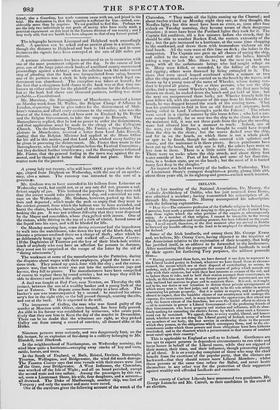The telegraphs between Liverpool and Holyhead work exceedingly well. A
question can be asked and an answer given in a minute, al- though the distance to llolyhead and back is 144 miles ; and in some instances the signals have been conveyed at the rate of 228 miles per minute.
A curious circumstance has been mentioned to us in connexion with one of the most prominent subjects of the day. In the course of last year, one of the large joint-stock banks of a midland county commenced proceedings against a debtor ; when his solicitor took the rather novel step of pleading that the bank was incapacitated from suing, because one of its partners was a clerk in holy orders; upon which legal en- forcement was abandoned. The exception was taken at hazard ; for the fact that a clergyman held shares in the bank was at that time un- known to either solicitor for the plaintiff or solicitor for the defendant ; but as the bank had above one thousand partners, nothing was more probable.— Constitutional.
Mr. Macvicar, the Boroughreeve of Manchester, received a letter on Monday week from M. Waller, the Belgian Charge d'Affaires in London, requesting him to give orders for the disinterment of Mali- bran's remains, and afford every assistance to the courier, who was the bearer of the letter, and who bad been sent to England by De Beriot and the Belgian Government, to take the corpse to Brussels. The Boroughreeve replied, that he bad no power to order the disinterment, and that application must be made to the clergy of the Collegiate Church. On the following Thursday, Mr. Foster, a Stipendiary Ma- gistrate in Manchester, received a letter from Lord John Russell, stating that the Belgian Minister had applied at the Home Office for his aid in this matter, and that Lord John wished every facility to
be given in procuring the disinterment. Mr. Foster then wrote to the Boroughreeve, who laid the application before the Festival Committee but they declined further interference ; and the Boroughreeve informed Mr. Foster, that the general feeling in the town was against the re- moval, and he thought it better that it should not place. Here the matter rests for the present.


























 Previous page
Previous page